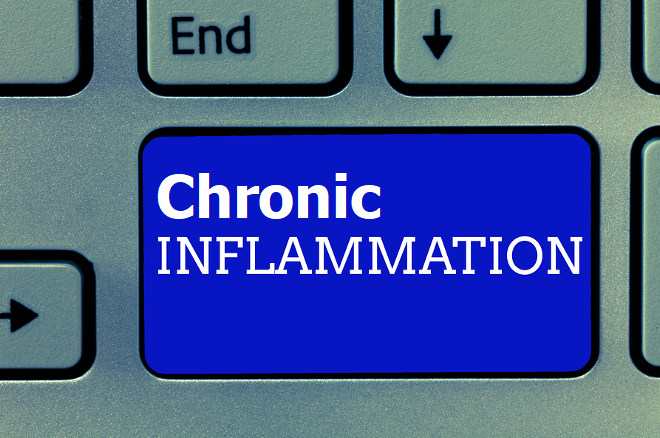One of the keys to preventing diseases is to reduce chronic inflammation. The healing process always involves some level of inflammation. And once the healing has been completed the inflammation goes away.
However, in today’s modern world there are foods and ingredients that are consumed daily that trigger chronic inflammation. This is a low-grade form of inflammation that continues to inflame cells and causes them to age prematurely.
This chronic inflammation also causes abnormal genetic responses that contribute to age-related disorders. In the last two years scientists have uncovered a key factor in chronic inflammation. It is a gene-regulating protein complex called:
Nuclear Factor kappa B or NF-kB
This NF-kB has been shown to be a primary initiator of inflammation. And inhibiting NF-kB can be used to reduce chronic inflammation. But before we talk about how to inhibit this gene-regulating protein, let’s look a list of age-related diseases that improve when NF-kB is kept in check:
-
Cancer Development
-
Heart Muscle Alterations
-
Poor Wound Healing
-
Arthritis
-
Asthma
-
Brain Cell Degradation
-
Insulin Resistance
A Brief Overview on Chronic Inflammation
To understand how to reduce chronic inflammation one needs to understand the inflammation process. Here is a brief overview:
First, most cells and body tissues use a common pathway when inflammation occurs. That pathway is the activation of NF-kB or nuclear factor kappa B. The key term here is nuclear, which refers to the nucleus of the cell.
The nucleus of every cell contains the genetic information that regulates your cells and what they do.
Second, when NF-kB is activated it affects the cell’s nucleus causing it to activate what are called cytokines. These are pro-inflammatory signaling molecules that are then released into the blood stream. These cytokines travel through your vascular system to trigger inflammation throughout your body.
Third, this inflammation then triggers other biochemical pathways that increase overall inflammation. Your cells respond to this increased inflammation by producing more NF-kB, which accelerates this inflammation cycle leading to what is called chronic inflammation. Chronic inflammation results in:
-
Cell Death
-
Tissue Loss
-
DNA Damage
-
Cell Aging
-
Increased Potential for All Types of Diseases
One of the keys to help reduce chronic inflammation is to inhibit the effects of NF-kB. Thankfully there are a group of nutrients that have been clinically shown to do that.
Natural Ways to Reduce Chronic Inflammation Caused by NF-kB
Currently there are no know drugs that are safe and effective in suppressing NF-kB. But there are several natural supplements that have been shown to inhibit NF-kB to help reduce chronic inflammation.
All of the following have been clinically shown to inhibit NF-kB:
Curcumin – This ingredient is found in turmeric and is one of the best and oldest-know inhibitors of NF-kB. This nutrient has been shown to help prevent a host of NF-kB associated health concerns like:
Toxin-induced liver damage
Stroke-induced brain damage
Obesity-induced damage to the heart muscle
Severe, acute pancreatitis
Colitis
Lumbar disc degeneration
Omega-3 Fatty Acids – Both EPA and DHA found in omega-3 fatty acids have been shown to inhibit NF-kB, especially as it applies to vascular inflammation. They also have a positive impact inhibiting NF-kB and its effect on brain health, non-alcoholic fatty liver disease, inflammatory bowel disease, and osteoporosis.
Alpha-Lipoic Acid – This ingredient has been shown to inhibit NF-kB as it relates to plaqeu formation in the arteries, bone loss, arthritis, and cataract formation.
N-Acetyl Cysteine or NAC – This nutrient is key in preventing liver cell damage and may have a positive effect in reducing the symptoms of Parkinson’s disease.
Reishi Mushrooms – Studies have shown a wide range of health benefits from this type of mushroom as it relates to inhibiting NF-kB. This includes reducing the potential for inflammatory bowel disease, atherosclerosis, lung cancer, and brain inflammation.
Green Tea – This common tea contains a polyphenol called epigallocatechin gallate or EGCG, which has been show to reduce the inflammatory steps associated with cancer and heart disease.
Cyanidin-3 Glucoside or C3G) – This is a dark-colored polyphenol found in dark fruits and berries. It has NF-kB inhibiting properties to as it relates to cardiovascular disease, inflammatory bowel disease, and retinal degeneration.
Resveratrol – This is a polyphenol found in wine and red grape. And has been show to be effective in preventing retinal degeneration by inhibiting NF-kB.
Just as there are foods and supplements that you can add to your nutrient intake to address chronic inflammation, there are also foods that you need to eliminate to reduce the potential for triggering NF-kB.
By making these changes you can significantly improve your overall health and wellness.

Leave a Reply
You must be logged in to post a comment.